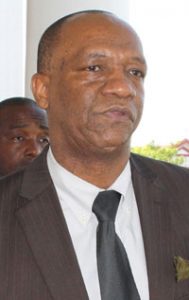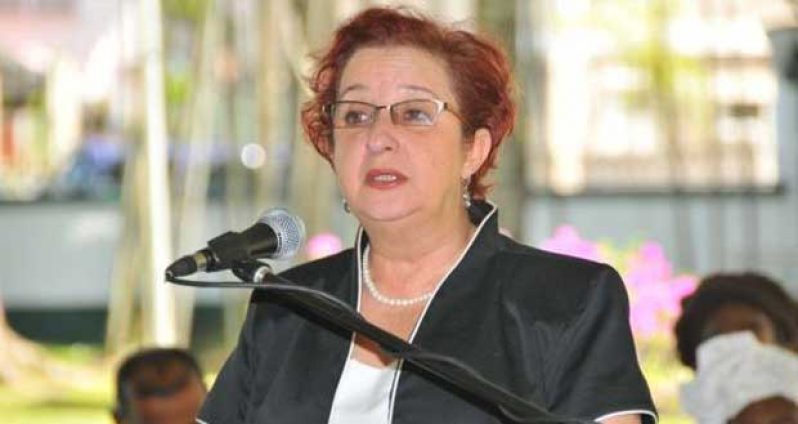THE main Opposition, A Partnership for National Unity (APNU), last Friday indicated that it will move to propose an amendment to the Standing Orders of the National Assembly, which are the rules that guide the House proceedings.And this motion was filed a few days ago, according to the Clerk of the National Assembly, Mr. Sherlock Isaacs, who added that the motion has been included on the Order Paper for the next House sitting on November 10.
Meanwhile, in an invited comment, Government Chief Whip, Ms. Gail Teixeira, yesterday explained that if such a motion were to be made, changes to the Standing Orders cannot be made from the floor of the House.
According to her, such a motion normally requires a notice of 12 days or the APNU Member of Parliament (MP) who brings the motion to the House can request that the Speaker of the National Assembly, Mr. Raphael Trotman, suspend the sitting for its consideration.
Either way, Teixeira said, the motion will be referred to the House’s Standing Order Committee.
“Changes to the Standing Orders cannot be made on the floor. Changes happen in committee not on the floor. Once it is referred to the Standing Order Committee, the committee will meet, discuss and make its recommendations to the House,” she said.
CLARIFYING ROLES
At the time APNU indicated its intent to move in this direction, General-Secretary and APNU MP, Mr. Joseph Harmon had stated that the Motion was drafted to bring greater clarity to both the role of the Speaker and the majority in the House.
“We will ask for amendments to allow for the majority to approach the Speaker to get a date set for the reconvening or adjourned date for the House…we are going through fresh Standing Orders so as you go through these things you will find that something is not properly catered for and amendments will have to be made,” Harmon said.
Among the Standing Orders to be amended are: Standing Order 8, 8(1), 8 (2) and 9, which address the convening of sittings of the National Assembly and the House’s recess.

Standing Order 8, “Ordinary Sitting of the Assembly,” says: “(1) Save as otherwise provided by the Constitution or resolved by the Assembly upon a motion moved by a minister, the Assembly may sit every day except Saturdays and Sundays and, unless the Assembly otherwise decide, every adjournment of the Assembly shall be to the next Sitting day.”
The second part, Standing Order 8 (2), Sitting convened at the discretion of the Speaker, adds: “If, during an adjournment of the Assembly, it is represented to the Speaker by the Government, or the Speaker is of the opinion, that the public interest requires that the Assembly should meet on a day earlier than that to which it stands adjourned, the Speaker may give notice accordingly and the Assembly shall meet at the time stated in such notice. The Clerk shall as soon as possible inform each member in writing, or telegram or by appropriate electronic means of any such earlier meeting.
“(3) Every direction under paragraph two (2) of this Standing Order shall be in writing and shall be signed by the Speaker and shall bear the business to be transacted and the meeting to which it relates.
“(4) Forthwith upon receipt of any direction under paragraph three (3) of this Standing Order, the Clerk shall inform every Member of the Assembly, personally, if practicable, of the day and hour appointed by the Speaker for the holding of the Extraordinary Sitting of the Assembly and of the business to be transacted at such meeting.”
Also addressed in this section are special sittings and Standing Order 8 (5) says: “(5) Except by leave of the Assembly, no business other than the business specified in the direction under paragraph two (2) of this Standing Order shall be transacted at any Extraordinary Sitting of the Assembly. At the conclusion of the business, unless the Assembly has otherwise decided, the Assembly shall stand adjourned without question being put to the day to which it had originally been adjourned at its last meeting.
“(6) There shall be Special Sittings of the National Assembly:-(a) When the President desires to address the Assembly on the State of the Nation; and(b) When the Government desires that a visiting Head of State, Head of Government or other dignitary shall address the Assembly.”
Standing Order 9, “Recess for the National Assembly,” states that: “Notwithstanding anything contained in Standing Order No. 8, unless there are special reasons for so doing, no Sitting of the National Assembly shall be held from10th August to 10th October in any year.”
Harmon has also stated that move for an amendment comes after consultations between APNU and the Alliance For Change (AFC).
LAST AMENDED
Currently, there are 113 Standing Orders that guide the workings of the House. They were last amended in 2011 by a Special Select Committee.
In 2011, it was reported that MPs had worked assiduously in conducting meetings over a four-year period where they carefully considered each Order: making deletions, insertions, and also ensuring that the language was gender neutral. Also included, for the first time, is a compendium of rulings by the Speaker.
On the 21st July, 2011, the Report of the Draft Standing Orders was adopted by the National Assembly.
These amendments were incorporated in the Standing Orders which have been reprinted for circulation to Members in the Tenth Parliament.
The Standing Order Committee is chaired by the Speaker and has a five-four membership, with the ruling People’s Progressive Party/ Civic (PPP/C) holding the minority.



.jpg)








